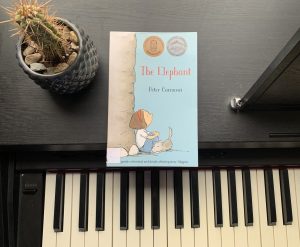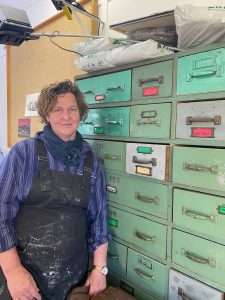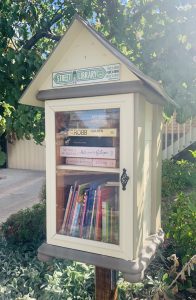I am a survivor

“I was not lucky. Luck implies you didn’t fight. I am a survivor.”
Eliza Walker tells the story of a woman who emigrated from war-torn Slovenia to Australia by boat in the 1950s, recounting her experiences of survival and extensive racial prejudice.
It is late morning in a small village in regional NSW. Nimmitabel’s “Welcome” sign as you drive-in states it has a population of 200, but only the half-dozen businesses lining the main street make it seem alive.
Isolated from most aspects of modern civilization, with a 30-minute drive to the nearest Woolworths or cinema, it relies heavily on tourists going to either the south-east beaches, or mountain ski slopes. But for now, it’s content with sun-lit porches and gardening, a gentle trickle of coast-going tourists stopping off for a meat pie and to stretch their legs.
Seated in the tea room of the Royal Arms B&B with a view onto the main street through lace curtains, an older woman sits, a serious, sad expression on her face. Her clothing, layers of wool and flannelette, are an attempt to keep out the chills of age and suppressed memories.
“People don’t believe what I have seen” she says.
Her face darkens and she pulls her cardigan around her tighter, leaning back into the armchair.
“I don’t really like to talk about it,” she says. “When you’re as old as me you just look forward to heaven and try to avoid encouraging memories of the past.”
She frowns, hiding from whatever she’s about to share. I don’t know what will happen when you re-open a wound as old and deep as this one. I hold my breath. With her words, we are both swept away from the little country town and into northern Slovenia in 1931.
Marijanna Jurović was born to an 18-year-old mother and grew up believing she had no father. Or, at least, not in any sense other than biological. He was an Italian police official and, upon her birth, disowned her and left her mother because she was not the son he wanted.
As it turned out, the poor Slovenian girl he had taken advantage of died two years later, leaving Marijanna to be raised by her grandmother.
World War II broke out when Marijanna was eight. During the war, her small world was blown apart and her childhood snatched from her.
“He came back for me, you know”.
Marijanna exhales heavily, referring to her father. Her eyes wander off to gaze out the window, lost in some long-suppressed memory. Her head of tightly-curled grey nods in my direction.
“He took me away and tried to make me be his child. He cut my hair, my beautiful long braids. He made me perm it.”
One day Marijanna’s father allowed her to visit her grandmother, but after seeing her so changed and so frightened, her grandmother shook:
“He didn’t touch you, did he?”
Scared and too young to truly understand the weight of this question, Marijanna simply shook her head.
“My father did not know how to be a father,” she continues. “So, on Friday nights when he finished work he would leave me in a room with a bit of food, then go to the pub. There he would drink and spend his money and make a mess of himself.”
Marijanna falters, considering her next memory.
“One day the Nazis came looking for him, so I took them to where he was. When we arrived at the pub, there he sat, all alone, surrounded by empty bottles and sitting in his own piss.”
When the Nazis saw how he had neglected his daughter and spent his time and money on alcohol, they were disgusted and returned the girl to her grandmother. Marijanna never saw or heard from her father again.
She recalls the brutality and bloodshed that followed. Recounting the atrocities she witnessed, her eyes glazed over in a traumatized daze.
Her uncle, a young man himself, was “given” to Adolf Hitler as a “gift”, although it is also likely that he was kidnapped. Marijanna says she never laid eyes on him again.
“Nobody knows what happened to him. He was just gifted to Hitler to do whatever Hitler wanted”.
Marijanna’s school became a barracks, the local churches became warzones. People would randomly disappear. It became common to see corpses lying in the streets. By the time Marijanna was 10, she had suffered from seven separate nervous break-downs. But that couldn’t be helped, everyone was suffering.
“People don’t like to believe me, people think I’m making it up, but I’m not,” Marijanna vents, her fists closing tight and her lips pursed.
“I have seen men rip babies from a mother’s arms because they are trying to get to her, and because the baby is screaming they physically rip it apart by its legs, or bash its head against a wall.”
This 85-year-old woman before me, waving her arms in a re-enactment of these murders, carries a weight no woman of 21st century Australia can imagine.
In today’s world, young women often joke of their “first world problems”, lamenting their poor wi-fi connection, a mistaken coffee order, or how they cannot afford both a new bag and shoes.
But to a survivor of war-torn Slovenia during the 1930s, such comments seem exceedingly ignorant.
“Kids of today talk about ‘living on the streets’ and being ‘gangster’, but they have no idea what they’re talking about,” Marijanna comments bitterly.
“I lived on the streets,” she says with emphasis. “I know what it was like to have to find a safe corner to hide in from rapists; to find frozen, rotting apples underneath snow and rejoice because it meant you had dinner that day; to beg God for your family to return.”
Her body quietly quivering as her head shakes in frustration and pain, Marijanna looks up, our eyes meeting. “All survivors relive it when they tell it, don’t mind me”.
In the little house where she and her grandmother lived, before her grandmother was taken away to a concentration camp, there was a small central room, a so-called ‘chimney room’.
From Marijanna’s description, I can only figure that today we might call it a smoke house. It was a room central to the house that you built fires in, and it warmed up the rest of the house through the walls. For the wealthy, who had proper fireplaces, this was not a common design feature.
So, when the Nazis or Ustaše came on a rampage through the house, looking for women to molest, her grandmother hid her in the smoke room. Dark, sooty and hot, Marijanna would peek through the cracks in the walls, spying on the intruders.
It was through this method that as just a child Marijanna was exposed to some of the grossest atrocities, including those committed against her grandmother. Marijanna slips a smile.
“How she scolded me when she found out I had seen what they did to her.”
In the minutes of silence that follow, the sadness restores to her expression. Through her eyes, almost like windows, I can see her watching it all again.
In late 1944, aged 13, after her grandmother was released from the concentration camp where she had been held for the years Marijanna lived on the streets, the two of them escaped over the border to Austria. There, in a so-called ‘outlanders camp’, called Wagna, they lived with other displaced persons for the next seven years.
Although I long to see photos of Marijanna from her youth, even of her wedding day or her children, she shakes her head. Because of the brutality and poverty of the war and immigration, and the disapproval of her two husbands of technology such as cameras, no images of a young Marijanna exist.
At 19 she met and married her first husband, Srećko (later known as Philip) Svikar. This marriage, however, was not for love, or even money. Rather, for the purposes of immigration to Australia, as married couples were given priority immigration over single or widowed persons.
“I never married for love” Marijanna says. “I married twice, but never for anything more than convenience or necessity.”
Before arriving in Australia by boat in 1951 (where her name was changed to Maryanne, as her original name was deemed too much like ‘marijuana’), they had a son, Tom. During the years that followed, where they lived in Seymour, Victoria.
The couple went on to have three more children in quick succession: Lydia, Maryanne, and Peter. What might have been a relatively simple life from there was in fact the beginning of a new kind of survival.
As foreigners, the Svikar family suffered extensive racism and prejudice. Unable to find a place to rent, all six of them were forced to live in a caravan.
Such feelings towards refugees remain an issue today, with xenophobic reactions now being directed towards those from the Middle East. And, with the current debate surrounding mass immigration of Syrian and Iraqi persons to Australia, Maryanne’s story cuts to the core.
After Philip committed suicide in 1967, widowed Maryanne was forced to take any work she could get.
“I was hospitalised for exhaustion and stress,” Maryanne says matter-of-factly. “My doctor says to me ‘stop working or you’ll be buried’, but I could not stop working, I had four children to raise.”
The memory of her ordeal is enough to drain Maryanne. Her chest heaves and an invisible cloud settles on the room. Traffic on the highway outside has all but ceased, and the orange of the late afternoon sun streams through the patterned lace curtains, dancing on the walls and across our knees.
Despite the difficulties, Maryanne managed to acquire work on a farm. However, being a foreigner and a woman meant that the farmers felt they could cheat her.
“They would say to me ‘you work for a day, get 20 shillings’, but when I finish work they go ‘oh, here, take five shillings and some bread and meat’.”
Maryanne’s lips pull back in a snarl. “They believed I was worth less because I was a woman. They believed no one would fight for me because I was widowed. They believed I did not understand because I was a foreigner.”
As well as suffering in her work, Maryanne was assumed by many Australian men to be ‘fair game’. Because she was foreign, she appeared to them as something exotic, and as she was widowed, no-one had a claim to her. Men wanted to be with her, and their wives hated her because they thought she was seducing their husbands.
Without a friend, Maryanne was once again forced to turn to a marriage of convenience. This marriage to Australian, Trevor Garad, was also beset with problems.
After an accident left Trevor with severe head injuries, Maryanne says he lost much of his sanity. And after only a year or so together, he left to explore the desert, telling Maryanne that he did not wish to put her or her children at harm, or let them see him deteriorate.
She never saw him again and five years later, at the age of 44, Maryanne was widowed for the second time, this time losing her husband to dehydration after he became lost in the Northern Territory.
Maryanne wears a tired, drained look.
“I have left that life behind,” she says. “I am finding ways to forget. I am free now of marriage, of motherhood and of labour.”
Exhaustion and repressed grief leak out in tear-form.
“I’m finished now,” she says. “I’d rather we just left it alone for good.”
Uncertain of her emotional and psychological state after hours of wound-picking, I nod. Maryanne collects herself, her shaking body and weary expression are underpinned by what almost looks like relief.
“I was not lucky. Luck implies you didn’t fight. I am a survivor.”
As I offer my hand to pull her up from the armchair and pull her walker closer to help her mobility, I look in admiration at the heavy-set lines on her face and her hunched back and shoulders. So much strength, so much perseverance.
“Have you ever considered going back?” I ask.
“Back where?”
“Back to Yugoslavia, to Slovenia, to see what has become of your home and life from there?”
“No. I will never go back,” she says. “I don’t have much time left, and I want to spend what I do have doing all I can to forget”.
She turns her back on me and moves away, pushing her walker ahead of her with the same firm, constant power that pushed her on throughout her earlier years.
“I have found peace now,” she assures me. “I have a church, a faith”.
After 85 years of battling against racial prejudice, poverty and loneliness, Maryanne is finally thriving. Meeting with a women’s Bible study every week, an active member of the Country Women’s Association, and now a passionate gardener, she is genuinely happy.
Everything about her is wrought with contradictions. From the wrinkles of grief and pain that line her face, to the small, contented smile on her lips. The fragile, weary bend of her back and yet the immense strength in her determined stance.
She has overcome poverty and racial prejudice, and stands here, smiling. As I watch her disappear through the doorway, golden sunset streams into the dark hall, casting a strangely symbolic mood.
I can’t help but think of Rose from the film, Titanic: “It’s been 87 years… and I can still remember everything.”
A final glance over her shoulder at me standing in the half-darkness, and she murmurs: “I think I can let go now”.




Be the first to comment!